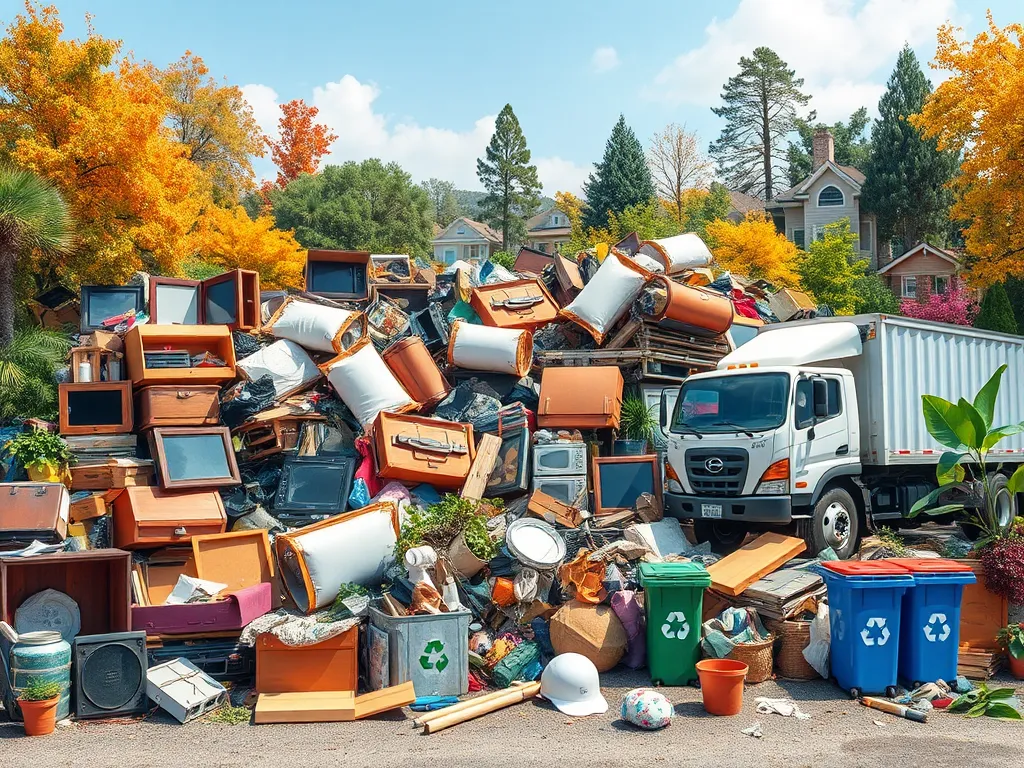Exploring Current Trends in the Junk Removal Industry

Trends in the Junk Removal Industry
The junk removal industry has seen substantial evolution over recent years, driven by changing consumer preferences, technological advancements, and a greater focus on sustainability. These trends in junk removal industry reflect a broader societal shift towards conscious consumption and efficient waste disposal. As households and businesses seek to declutter and manage waste responsibly, the variety and quality of junk removal services continue to improve.
Understanding global trends in solid waste management is crucial, and you can explore key insights at this source: https://datatopics.worldbank.org/what-a-waste/trends_in_solid_waste_management.html.
One of the significant trends in junk removal industry is the growing emphasis on eco-friendly practices. Many companies now prioritize sustainable disposal methods, ensuring that items are either recycled or repurposed instead of ending up in landfills. This shift has not only attracted environmentally conscious consumers but also aligned with regulations promoting greener waste management practices.
Moreover, technology is reshaping the junk removal landscape, making services more accessible and efficient. The introduction of mobile apps for booking and tracking services streamlines the customer experience. In addition, the use of IoT devices allows businesses to better monitor inventory, while data analytics helps optimize operational efficiency. These innovations have created a more dynamic and responsive market, enabling companies to meet consumer demand promptly.
Consumer behavior is also influencing trends in junk removal industry. As urbanization continues to rise, so does the amount of waste generated. This increase has led to a higher demand for professional junk removal services, as people look to manage their growing clutter effectively. Furthermore, evolving consumer expectations regarding service quality and responsiveness have pushed businesses to adapt and innovate continuously to meet these demands.
Regulatory changes are another factor driving trends in junk removal industry. Local governments are implementing stricter regulations on waste disposal and requiring compliance with environmental laws, which has resulted in changes to how junk removal companies operate. These regulatory pressures compel businesses to adopt more sustainable practices and ensure compliance with licensing requirements, ultimately benefiting the environment and communities.
Sustainability Practices in Junk Removal
Eco-friendly disposal methods are becoming the norm in the junk removal industry. Many companies have adopted practices that prioritize recycling and responsible waste management. This includes sorting through collected items to find recyclable materials and offering disposal options that minimize environmental impact, ensuring that junk is managed in a way that benefits the planet.
Recycling and repurposing junk is a significant focus for many businesses in the industry. By finding new uses for old items, companies can reduce the volume of waste that ends up in landfills. This trend not only aligns with environmental goals but also resonates with consumers looking to contribute to sustainability efforts.
The impact on local communities cannot be underestimated. Many junk removal companies engage in programs that contribute positively to their local areas, whether through job creation, community clean-ups, or partnerships with local charities to donate reusable items. This fosters a sense of community and illustrates the social responsibility aspect of the junk removal industry.
Green certifications for junk removal services are gaining traction as more businesses seek to demonstrate their commitment to sustainable practices. Certification can serve as a marketing advantage, helping consumers make informed choices about the services they use while encouraging companies to uphold high environmental standards.
Technology Influence on Junk Removal
The use of apps for booking services has revolutionized the junk removal industry. Customers can quickly schedule pickups, track their service in real-time, and receive instant quotes through user-friendly platforms. This convenience plays a significant role in customer satisfaction and encourages the use of professional services over DIY options.
IoT technology is being utilized for tracking junk inventory and optimizing collection routes. With real-time data, companies can make informed decisions about when to collect items and how to maximize their operational efficiency, leading to cost savings and reduced environmental impact.
Data analytics is another game-changer for operational efficiency in the junk removal industry. Companies are harnessing data to analyze customer preferences, measure service performance, and identify areas for improvement. By leveraging data insights, businesses can enhance their service offerings and respond more effectively to market demands.
Virtual reality (VR) is an emerging tool that can help customers visualize the impact of decluttering their spaces. By providing immersive experiences, VR allows consumers to see potential transformations, encouraging them to engage with services that can help them achieve their desired outcomes. This innovative approach not only enhances customer interaction but also promotes the benefits of junk removal.
Market Growth and Consumer Behavior
There has been a notable rise in demand for junk removal services as more individuals and businesses realize the benefits of professional assistance. Factors such as increasing urbanization, growing environmental awareness, and a desire for minimalism are driving more people to seek out junk removal services to maintain clean and functional spaces.
Consumer preferences and expectations are continuously evolving, with clients increasingly seeking prompt, reliable, and environmentally responsible services. As competition in the junk removal industry intensifies, companies are striving to stand out by improving service quality, enhancing customer communication, and showcasing their commitment to sustainability.
The impact of urbanization on junk volume is significant, as urban centers generate higher amounts of waste compared to rural areas. This necessitates robust junk removal services to address the constant influx of discarded items, making it essential for companies to adapt their services to cater to the demands of metropolitan consumers.
Emerging demographics are shaping the junk removal market, with younger generations, especially Millennials and Gen Z, embracing services that align with their values and lifestyles. This demographic shift encourages junk removal businesses to adapt marketing strategies and service offerings to appeal to these socially-conscious consumers.
Regulatory Changes Impacting Junk Removal
Local regulations on waste disposal are becoming more stringent, influencing how junk removal services operate. These regulations often dictate how companies must handle different types of waste materials, leading to a more organized and responsible approach to junk removal.
Compliance with environmental laws is essential for junk removal businesses, as violations can result in penalties and reputation damage. Companies are now investing in training and resources to ensure they meet these legal requirements while fostering a culture of environmental responsibility within their operations.
Licensing requirements for junk removal businesses have also increased, with many jurisdictions mandating specific licenses to operate legally. This added layer of regulation ensures that only qualified companies offer junk removal services, contributing to a more professional and accountable industry.
The impact of legislation on pricing strategies cannot be overlooked. As businesses adapt to new regulations, they may incur additional costs, leading to adjustments in pricing structures. This shift influences how companies position themselves in the market and can affect consumer choices when seeking junk removal services.
Innovative Business Models in Junk Removal
Subscription-based junk removal services are an innovative approach gaining popularity within the industry. By offering consumers the option to subscribe for regular pickups at a fixed rate, companies can create steady revenue streams while providing convenience for clients who need ongoing decluttering services.
On-demand and scheduled pickups are becoming standard as customer convenience takes priority. This model allows consumers to choose when they want their junk removed, catering to busy lifestyles and ensuring that services are accessible when needed most.
Franchising opportunities in junk removal have expanded as more entrepreneurs seek to enter the market. Franchises provide a tested business model and brand recognition, making it easier for new operators to establish themselves and meet the growing demand for junk removal services in various regions.
Collaborations with local charities for donations are becoming increasingly common, with junk removal companies working to extend the life of usable items. By engaging in community partnerships, these businesses not only reduce waste but also support local organizations, fostering goodwill and loyalty among consumers.
